 Petzlover
Petzlover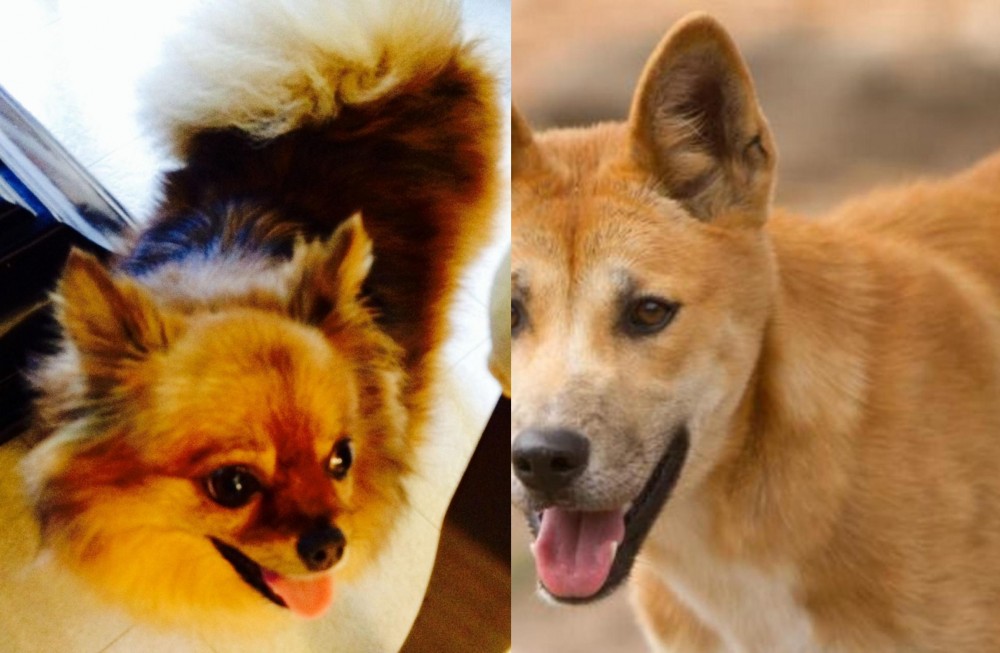 Chiapom is originated from United States but Dingo is originated from Australia. Chiapom may grow 35 cm / 13 inches shorter than Dingo. Chiapom may weigh 24 kg / 52 pounds lesser than Dingo. Both Chiapom and Dingo has almost same life span. Chiapom may have less litter size than Dingo. Both Chiapom and Dingo requires Moderate Maintenance.
Chiapom is originated from United States but Dingo is originated from Australia. Chiapom may grow 35 cm / 13 inches shorter than Dingo. Chiapom may weigh 24 kg / 52 pounds lesser than Dingo. Both Chiapom and Dingo has almost same life span. Chiapom may have less litter size than Dingo. Both Chiapom and Dingo requires Moderate Maintenance.
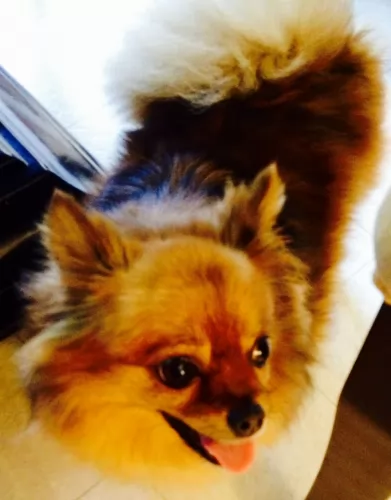 The Chi-Pom or Chiapom comes from mixing the Pomeranian and the Chihuahua, and both these dogs are toy breeds and known as companion dogs.
The Chi-Pom or Chiapom comes from mixing the Pomeranian and the Chihuahua, and both these dogs are toy breeds and known as companion dogs.
These little dogs each have their own individual histories, but but being a cross breed, the Chi-Pom’s history isn’t well documented particularly well.
Nobody seems to know precisely when this new dog breed came into being, but they were first bred in the United States.
 The Dingo dog was in all probability, introduced to Australia thousands of years ago. He isn’t your usual domesticated dog and in fact it is a feral dog native to Australia.There are stories that suggest that while they may have once been pets, they were abandoned so that they reverted back to their wild state.
The Dingo dog was in all probability, introduced to Australia thousands of years ago. He isn’t your usual domesticated dog and in fact it is a feral dog native to Australia.There are stories that suggest that while they may have once been pets, they were abandoned so that they reverted back to their wild state.
They became pests for Australian farmers, going for their livestock, and huge fences were erected. The different climates in Australia have meant different kinds of Dingo developing, so while the desert ones are like the desert sands - golden yellow to red the alpine ones are rarer and are cream colored.
These wild canines were also introduced to Southeast Asia some 3,500 years ago, however the dog’s exact origin is debatable. There are any number of groups of people who could have brought the dingo to Australia, and among some of these are Indian mariners or maritime hunters.
The dog has been found in many parts of mainland Australia but never became established in Tasmania.There has also been an effort to remove the Dingo from farming areas. It is interesting to note that the first Dingo, referred to as the Australian dog, was registered at the London Zoo in 1828.
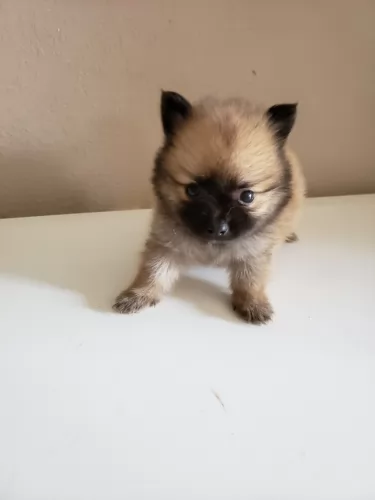 The Chi-Pom or Chiapom isn’t a pure bred dog, but a cross between the Chihuahua and the Pomeranian. This toy breed’s coat can be shortish like the Chihuahua or feathery and medium to long like with the Pomeranian, and the coat will be soft and shiny.
The Chi-Pom or Chiapom isn’t a pure bred dog, but a cross between the Chihuahua and the Pomeranian. This toy breed’s coat can be shortish like the Chihuahua or feathery and medium to long like with the Pomeranian, and the coat will be soft and shiny.
He has pointed ears, much like a fox, and the long tail is carried upward and curls over the back. The coat can be a solid color such as white, tan, cream, fawn, brown or gray, with the most common color being light brown.
If he takes more after the Pomeranian, he may need to have his hair cut. The typical Pomchi dog’s head is more round that the Pomeranian but with the narrow muzzle. The eyes are large and dark.
The Chiapom is a small dog that measures just 15 – 25cm in height and weighs between 2 and 8kg.
Pomchis are intelligent and inquisitive, having a temperament which comes from either of the two breeds which are quite similar.You’re definitely going to have an entertaining little dog, one who is energetic, curious and alert.
He isn’t a good choice with small children as he gets nervous and aggravated when handled improperly. Nervous and hurt, he may nip and then often he gets the blame, whereas he just shouldn’t have to put up with small children.
He loves to be in the company of his human family who treat him well, and he doesn’t like to be left alone. He is an intelligent little dog and is eager to learn. Therefore, even though he is small, training and socialization will be good for him and give him an even more amicable disposition.
 An interesting fact with these fascinating feral dogs, is that like humans, they’ve got rotating wrists. This characteristic of theirs allows them to use their paws much like the human hand to catch their prey. A domesticated Dingo can therefore learn how to open doors.
An interesting fact with these fascinating feral dogs, is that like humans, they’ve got rotating wrists. This characteristic of theirs allows them to use their paws much like the human hand to catch their prey. A domesticated Dingo can therefore learn how to open doors.
The Dingo is a medium sized dog standing at roughly 52 – 60cm in height, measuring up to 1.2 meters in length and weighing roughly between 23 to 32kg.
He has long canine teeth, a long muzzle, upright ears and a long, thick tail. The coat is essentially one color, sandy, white, cream, tan or black and sometimes there are white markings on the chest, the paws and around the muzzle.
The fur is typically shortish and thick — though the hair's thickness and length will depend on the climate of the area. The Dingo is a moderate shedder and a good brushing of the coat twice a week will keep the thick coat shiny and healthy.
These wild canines are social animals, and in the wild they live in packs. There are some that opt to live on their own.
They’e territorial, but they are able to share their living space with humans. They’re generally shy around humans, but a Dingo that is trained and socialized can get along well with children and pets in the home.
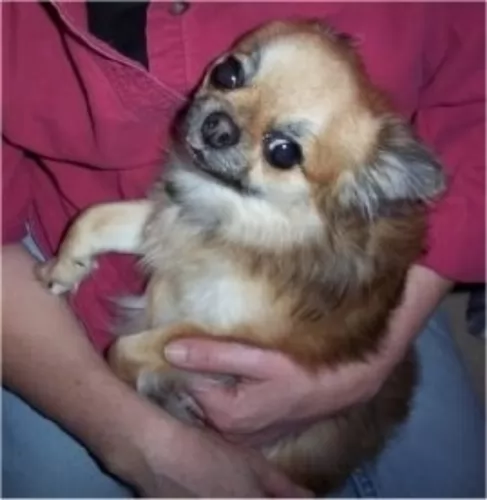 Crossing two breeds of dog is the in-thing these days, and its not surprising that lovers of small breed dogs would think to mix the Chihuahua and the Pomeranian.
Crossing two breeds of dog is the in-thing these days, and its not surprising that lovers of small breed dogs would think to mix the Chihuahua and the Pomeranian.
The Chiapom is affectionate, playful and good-natured with their human family. They are full of personality, are spunky and brave, believing they can protect their families. He may be too frail for this but he alerts you to danger with his barking.
With the Chiapom, you’re going to have an awesome little friend who will stand by you in thick and thin.
 Dingoes have been domesticated successfully. Some people swear by them as making a fantastic pet. However, they’re wild dogs and can be unpredictable.
Dingoes have been domesticated successfully. Some people swear by them as making a fantastic pet. However, they’re wild dogs and can be unpredictable.
There are others who have tried to keep the Dingo as a pet but who have discarded them when they proved to be a danger in the home.
Dingoes can be trained but they’re high energy dogs and require a lot of exercise. How do you feel about owning a Dingo as a pet? Many people feel that its not fair to bring an essentially wild animal into your home. They feel that there are plenty of rescue dogs dying for a home without human beings searching in the wilds for an unusual pet, and regretting it later on.
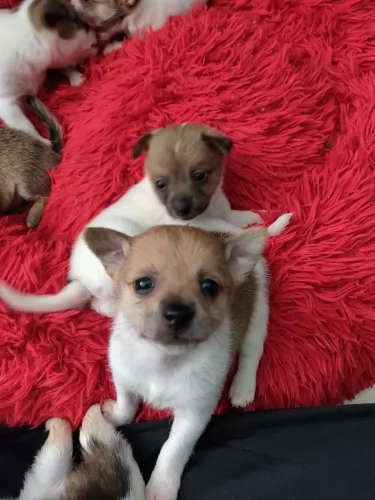 Being a cross bred, the Chiapom will be healthier than the purebred Chihuahua or Pomeranian. He is full of personality, but sometimes he can have his fair share of doggy troubles too.
Being a cross bred, the Chiapom will be healthier than the purebred Chihuahua or Pomeranian. He is full of personality, but sometimes he can have his fair share of doggy troubles too.
He is more prone to injuries just because he gets under your feet all the time. We look at one or two health issues with this small breed that you should be aware of -
This is an ailment which can be found in all dogs but it occurs more in smaller dogs. An inflamed pancreas from trauma, infection or a metabolic disorder can mean your little dog vomiting, being uncomfortable with stomach pain and shivering.
This is a disease which involves the trachea which is also known as the windpipe. When the windpipe weakens, it becomes difficult to breath. Obesity in your pet as well as dust and kennel cough can contribute to this ailment.
 The Dingo is a long-lived dog and you can expect your Dingo to live till anything between 15 and 20 years.
The Dingo is a long-lived dog and you can expect your Dingo to live till anything between 15 and 20 years.
When it comes to health issues, they are robust and resilient, having less medical problems to contend with than your regular dog.
However if you see that your Dingo is not his usual robust, energetic self, get him to the vet as soon as you can.
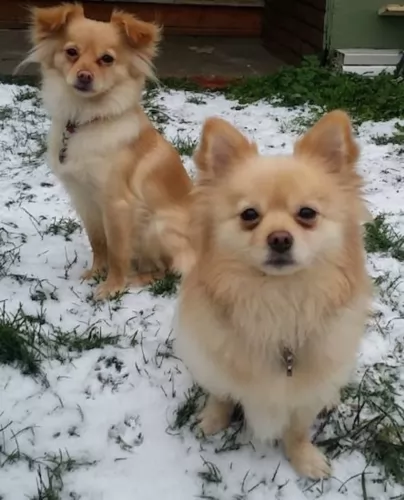 The Pomchi is a small dog who is looked upon essentially as an indoors dog, so it is quite able to adapt to apartment living as he won’t require large doses of exercise.
The Pomchi is a small dog who is looked upon essentially as an indoors dog, so it is quite able to adapt to apartment living as he won’t require large doses of exercise.
With some stimulating toys, he is able to exert energy indoors and will love to chase a ball down the passage. He certainly won’t do well in cold weather and being left outdoors.
The Chiapom often has the longer hair of the Pomeranian so it becomes necessary to give your little dog a good brush twice a week for the hair to remain tangle-free and to keep it shiny and silky.
You’ll notice with your Pomchi that he could possibly have overactive tear ducts so that they have a discharge. A small damp cloth can be used to wipe his eyes.
Small breed dogs often require more calories than larger dogs because of their higher metabolic rates. He is a small dog that will require all the right vitamins and minerals.
Commercial dog foods are certainly convenient, and the best quality ones contain the nutrients a dogs needs to remain health. It is always beneficial for your 4-legged friend if you can include some brown rice, a little bit of cooked chicken and vegetables in his diet. However, if you are uncertain about the nutrition requirements of your pet, speak to your vet and get help with a food that caters for your dog’s age, breed and activity levels.
 Caring for your Dingo will be different to caring for your usual pet dog. You have to remember the Dingo is an ancient, wild species with some unique characteristics. Having a Dingo as a pet and companion may not be an easy task, and it is why many people selfishly dump their Dingoes – they didn’t quite live up to what they had in mind.
Caring for your Dingo will be different to caring for your usual pet dog. You have to remember the Dingo is an ancient, wild species with some unique characteristics. Having a Dingo as a pet and companion may not be an easy task, and it is why many people selfishly dump their Dingoes – they didn’t quite live up to what they had in mind.
Your Dingo, just like any other dog you’d have, will require training and socialization, and the earlier the better. No training will simply mean you having an unruly pet in the home.
Your Dingo can be fed just like you would with your other dogs. You can feed him quality dog kibble as his main diet, but you can also add in cooked rice, vegetables and chicken. Your Dingo is essentially a wild dog, so you will definitely want to include some raw meat into his diet from time to time as well.
A Dingo is used to running free so he will require plenty of outdoor exercise. He can also be put on a leash and taken for a walk. He’ll love joining you in your activities such as running alongside you as you jog or cycle. He can adapt to life in the city if he is well exercised but he isn’t suited to a small home or garden.